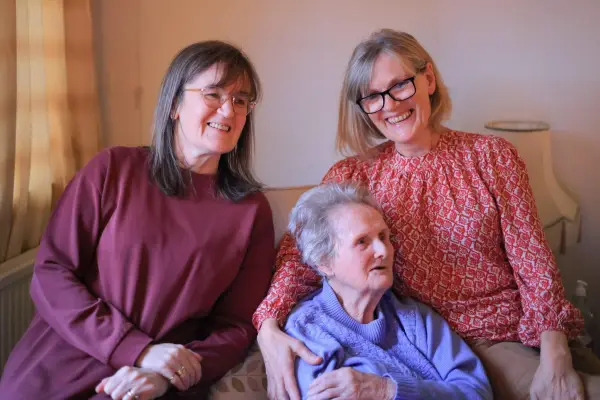Funding elderly care at home
Worried about how to fund care at home for your loved one? Our complete guide explains UK home care funding and how your family can access financial support for elderly care.
Find a carerCall us
6,000+ Carers
Select from over 6,000 qualified carers
Fast matching
Care can begin in as little as 24 hours
Across Great Britain
We have organised care in every GB postcode
Cost efficient
Costs on average 35% less than traditional services

Local authority funding for care
If your loved one needs help at home, the local authority (council) is usually the first place to start. Funding decisions are based on two key assessments:
- A care needs assessment – to identify what level of support your loved one requires.
- A financial assessment (means test) – to determine how much they are expected to pay towards care.
If you’re exploring local authority funding, the council will look at your family member’s income, savings, and assets – not yours – to decide their contribution.
Action: Contact your local council as soon as possible to request a care needs assessment if you think your loved one may need funding for home care.

Care funding thresholds in England, Scotland, and Wales
The amount of funding available depends on the value of your loved one’s assets (savings, investments, and property). If your loved one receives live-in care, the value of their main residence (where the care takes place) is not included in the financial means test.
England
- If your loved one has more than £23,250 in assets, they are classed as a self-funder and will need to pay the full cost of their care.
- If their assets are between £14,250 and £23,250, the council will part-fund their care, and your loved one will contribute the rest.
- If their assets are below £14,250, the local authority will usually fund care in full.
Scotland
- People with over £35,000 in assets are considered self-funders and must pay for their own care.
- Those with assets between £21,500 and £35,000 will receive partial funding from their local council.
- If their assets are below £21,500, the council will generally cover the full cost of care.
Wales
- In Wales, anyone with over £50,000 in assets is expected to pay the full cost of their care.
- If assets are below £50,000, some level of local authority funding is usually available.
Personal budgets and how they work
Once the assessments are complete, your loved one will be given a personal budget – the amount the council has calculated to meet their care needs. Families can choose how this funding is managed:

Direct Payments (England and Wales)
The council pays the money directly to your loved one, allowing your family to choose and manage your preferred home care provider, for example Elder. Learn more about government guidance:

Self-directed Support (Scotland)
Self-directed Support works in a similar way. If your loved one is over 65, they are entitled to free personal care. Choosing Option 1 lets you receive funds directly and arrange care with your chosen provider. Learn more about SDS.

Top-up fees
Even if your loved one qualifies for funding, you might still need to make a top-up payment. This happens when the cost of your chosen care provider exceeds the council’s allocated budget. The difference must be paid privately, often by family members.

NHS Continuing Healthcare Funding (CHC)
If your loved one has complex, ongoing health needs, they may qualify for NHS Continuing Healthcare (CHC).
CHC funding covers 100% of care costs, regardless of income or savings. To qualify, your loved one must have a primary health need, meaning their care requirements are mainly health-related rather than social. This may apply for conditions requiring complex medical support, such as PEG feeding, advanced wound care, or constant monitoring.
- Assessment: Conducted by an NHS multidisciplinary team.
- No financial means test: CHC is completely non-means-tested.
- Across the UK: In Scotland, CHC has been replaced by Hospital-Based Complex Clinical Care. Wales runs its own version of the scheme.
If you’re considering this type of funding, we’ve shared some resources below:
Palliative and end-of-life care funding
If your loved one is nearing the end of their life, fast-track funding may be available:
- NHS Fast Track Funding: For people with a rapidly deteriorating condition, allowing urgent CHC funding (often arranged within 48 hours).
- Attendance Allowance: A non-means-tested benefit for those over 66 who need care or supervision due to illness or disability.
Funding for dementia care and other specific conditions
There isn’t a specific scheme called “dementia care funding.” Eligibility depends on the level of need, not the diagnosis:
- Dementia or Alzheimer’s: Needs around memory loss or personal care usually fall under local authority funding.
- Huntington’s, MS, or Complex Conditions: May qualify for NHS Continuing Healthcare (CHC) if the health needs are intensive or unpredictable.

Self-funding home care
If your loved one’s assets are above the local authority threshold, they will need to self-fund their long-term care. Families often explore ways to release funds from property:
- Lifetime mortgages: A loan secured against the home, repaid when the property is sold.
- Home reversion plans: Selling all or part of the home in exchange for a lump sum or income, while continuing to live there rent-free.
These are complex financial products that can affect inheritance and benefits. Always seek guidance from a qualified later-life financial adviser. For more information about self-funding home care, read this article.
Tools and support
Making decisions about care funding can feel overwhelming. These resources are designed to help your family understand what support is available and take the next steps with confidence.

Use our free Care Funding Calculator
Want to know what funding your family might be entitled to? Use our free Care Funding Calculator for an instant indication of eligibility across the main funding streams. Our calculator is currently aligned with local authority guidance in England.
Start the Funding Calculator
Get expert support
Navigating care funding can be daunting, but help is available:
- Financial Advice: The Society of Later Life Advisers (SOLLA) connects families with accredited advisers who specialise in later-life care and funding.
- Independent Advocacy: Advocates can guide you through assessments and applications, ensuring your loved one’s rights and wishes are represented. If you want to learn more about using advocates, OPAAL is an independent charity offering free resources and signposting services.
FAQs about care funding
Still have questions?
0333 920 3648Contact your local council to request a care needs assessment. If eligible, a financial means test will follow. For complex medical needs, ask about NHS Continuing Healthcare (CHC).
In England, the threshold is £23,250. If your loved one’s assets are above this, they will need to self-fund. Thresholds vary across the UK.
No. When care is provided in your loved one’s home, the property’s value is excluded from the means test.
Yes. If your loved one receives a personal budget via Direct Payments (England and Wales) or Option 1 Self-Directed Support (Scotland), you can choose a provider such as Elder.
Learn more about our services

Live-in care
Long-term 24-hour support
- A carer lives in the home to provide round-the-clock support
- Suitable for people living with conditions like dementia, reduced mobility, etc.
- For long-term care needs

Respite care
Temporary 24-hour support
- A carer moves in for a few days to provide round-the-clock support
- Suitable to cover for a main caregiver or for a temporary increase in care needs
- Minimum duration of 3 days

Visiting care
Flexible home visits
- Book as many hours as you need for help in the comfort of your home
- Support with everyday tasks like grooming, walks, cooking, etc.
- From as little as 1 hour per week